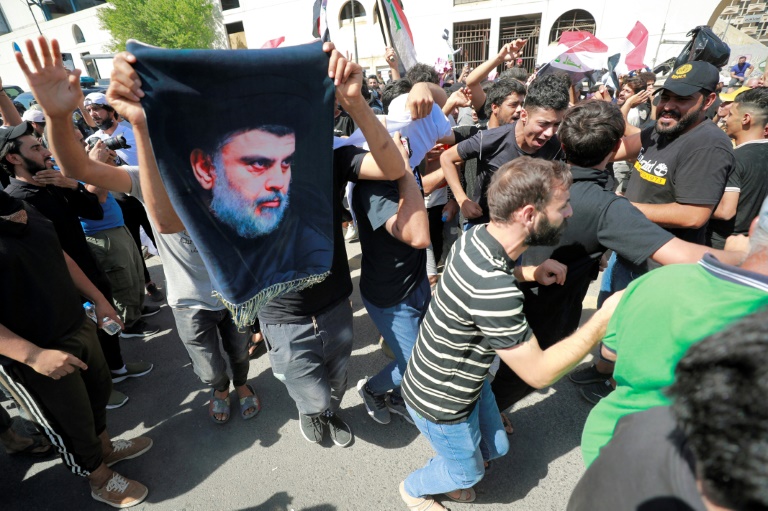Parliament in Iraq vows to elect new president

Iraqi supporters of Shiite Muslim cleric Moqtada Sadr gather in Tahrir Square in Baghdad on September 28, 2022
Baghdad – Iraq’s parliament will meet Thursday to “elect the president”, speaker Mohammed Al-Halbousi’s office said, in a surprise move seen at trying to end months of political impasse.
The oil-rich but troubled country has already made three failed attempts this year to elect a new head of state, between February 7 and March 30.
More than a year after the last general election, Al-Halbousi’s office said Tuesday that the parliamentary session two days later would have “a single item on the agenda, the election of the President of the Republic”.
Iraqis last voted on October 10, 2021 in a general election brought forward by a wave of mass protests against endemic corruption, rampant unemployment and decaying infrastructure.
Ahead of Al-Halbousi’s announcement, the United Nations mission had urged political factions to end the deadlock, warning that “Iraq is running out of time”.
The country has yet to form a new government after last year’s election, leaving caretaker Prime Minister Mustafa Al-Kadhimi in charge.
Rival Shiite Muslim factions in parliament have been vying for influence and the right to select a new premier and government.
The standoff has seen both sides set up protest camps recently and at times sparked deadly street clashes in Baghdad.
– ‘Stifling crisis’ –
On August 30, current President Barham Saleh had urged “new, early elections in accordance with a national consensus”, saying these could provide “an exit from the stifling crisis”.
The largely honorific post of Iraqi president is traditionally reserved for a Kurd.
The post generally goes to the Patriotic Union of Kurdistan (PUK), while the Kurdistan Democratic Party of Kurdistan (KDP) keeps control over the affairs of autonomous Kurdistan in northern Iraq.
But the KDP is also eyeing the presidency and will present its own candidate on Thursday.
There are currently two obvious candidates: the PUK’s Saleh, the incumbent, and current Kurdistan Interior Minister Rebar Ahmed of the KDP.
Once parliament elects a new president, that person must then designate a prime minister, who is chosen by the largest coalition in parliament.
This has been the focus of deadlock between the two main Shiite factions on Iraq’s political scene.
On the one hand is the fiery cleric Moqtada Sadr, who wants parliament dissolved and new elections.
On the other sits the Coordination Framework, an alliance of pro-Iran Shiite factions including former paramilitaries, that wants a new government before fresh elections are held.
Tensions last boiled over on August 29 when more than 30 Sadr supporters were killed in clashes with Iran-backed factions and the army in Baghdad’s Green Zone, the capital’s fortified government and diplomatic district.
Iraq has raked in huge revenues from energy exports this year, and the central bank is holding a colossal $87 billion in foreign exchange reserves.
However, the money remains locked up because Al-Kadhimi is not authorised to submit an annual state budget to parliament in his capacity as caretaker prime minister.
The UN mission said it is “imperative” that a budget is adopted before the end of the year.
